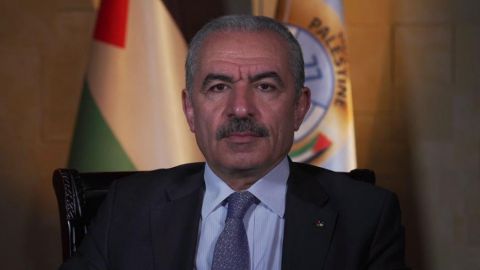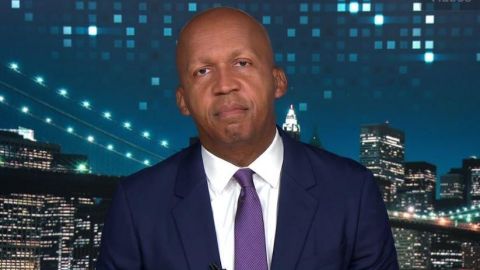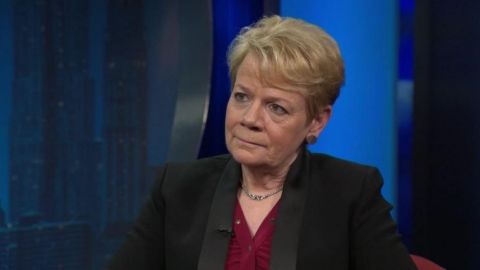Read Transcript EXPAND
ALICIA MENDENDEZ: I watch what you do and I’m in awe of what you do and I marvel at it.
I also have no idea what you’re doing.
(LAUGHTER)
Right? Like what makes a great conductor great?
MARIN ALSOP, AMERICAN CONDUCTOR: Well, there’s a physicality to it, of course, because it’s all about gesture and body language. And if I took you to hear and see five students of mine conduct the same piece with the same orchestra, you would hear the difference.
MENDENDEZ: Really?
ALSOP: Yep. Because there’s a — people respond — it’s just like body language, just like shaking hands with someone. You know how you say, ah, oh, I like this person. There’s something inherent in body language and who we are as individuals that an orchestra responds to, or doesn’t respond to. So that’s — there’s a physicality to it. And of course, there’s a — there are technical aspects to it as well, that you don’t have to really understand, there are patterns and things that we do. But beyond that, there’s also an inspirational quality and a passion quotient, I would say, that needs to be present, so that the role of the conductor, besides being the messenger of the composer, which is our number one responsibility, is to bring out the best in the musicians — enable them to be the best they can be. And that requires a lot of different skills. I mean, you have to cajole them. You have to humor them. You have to be strong. You have to be gentle. You know, and all of those qualities come into play. I imagine what makes a great conductor — is the exact same as what makes a great leader. It’s, you know, it’s very hard to put into words and articulate. But everyone knows it.
MENDENDEZ: You’re the first woman to head a fulltime, major American orchestra. What does that mean to you?
ALSOP: Well, I’m — I feel very fortunate that the orchestra is the Baltimore Symphony —
— because —
(MUSIC BEGINS UNDER SPEECH)
— it’s a superb orchestra. Exceptional. And I conduct [13:40:00] all over the world and I absolutely love coming back always to Baltimore, to my orchestra. And I think in many ways, the fact that it was Baltimore enabled me to experiment more than in an orchestra that perhaps has, in a bigger city that maybe has more entrenched tradition. In Baltimore, they were very open to changing around the programming, because I like to experiment with that and looking at a series where I talk to the audience and the orchestra joins me and — we’re starting a program for kids and we’re starting a program for non-professional musicians; we call it “Rusty Musicians” —
(LAUGHTER)
— where they can come and play. You know, these ideas that I have to try to, to try to reach more people and open up the doors, they were really embraced by the Baltimore Symphony.
So I think, you know, being the first woman in this role — I’m very proud. I’m also — I have to say, I’m a little bit — I don’t know, I find it a little bit said, that we could be in the 21st century and there could still be firsts for women. You know, I’m hoping that pretty soon there will be the second, third, fourth, fifth and we won’t be counting anymore firsts. At the same time, being the first gives me a platform to try to help other people and other women, particularly in this field.
MENDENDEZ: Talk to me about when you first fell in love with music.
ALSOP: I’m not — I’m not a good person to measure —
(LAUGHTER)
— this by because my parents were both classical musicians.
My father played at the New York City Ballet. He was Concertmaster for 30 years and my mother was a cellist there. So you know, I think of them sitting around their apartment and saying, you know, we really need — we need to find a pianist. Oh, let’s make one. You know, so that’s why I was born. I had a job immediately; I was supposed to be a pianist and I hated the piano.
(LAUGHTER)
I really hated the piano. And somehow, when I was about six years old I retired from the piano and they tricked me into playing the violin and I loved the violin. There was something physically about it, you know, maybe wrapping your arms around it and the quality of the sound and — then, then it was, for me I really could find an expression for my soul. And it was when I played in the orchestra that I really fell in love with music. Because I think the sound, but also the social dimension to it and being around all these other kids and — just doing something that felt meaningful together.
MENDENDEZ: And when did you realize, I want to be a conductor?
ALSOP: Well, I got, I started getting into a little bit of trouble. I was in the Julliard Pre-College Orchestra and I guess they were getting some complaints that somebody in the back of the second violins was trying to lead the whole orchestra —
(LAUGHTER)
— so apparently that was me. I was smiling and moving around and jumping around. And my father, luckily, took me to a concert, a Young People’s Concert here in New York and the conductor came out and he started talking to audience; I thought he was talking to me. You know, he’s explaining the music. Then he’d turn around and he was so animated; he was jumping around, you know, going crazy. And I turned to my father (LAUGHS) — I said, oh, look, I could be the conductor. Nobody’s yelling at him. So this was — and it was Leonard Bernstein. So that was my motivation. I think it was more aerobic than anything else. You know, I was like, okay, I can do that and not get in trouble.
MENDENDEZ: Leonard Bernstein goes on to become your teacher, your mentor. That is a heck of a teacher to have.
ALSOP: Yeah, it was pretty awesome.
MENDENDEZ: What was it like studying with him?
ALSOP: He was extremely generous, extremely warm. He didn’t have that sense of personal space that most humans have. You know —
He was like a huge puppy, in a way, always kissing and hugging everybody and just really, really connecting — and also, he was terrifying, too. You know, because he could suddenly turn and say something that could just cut you to the core. Luckily I could read him pretty well, so I knew when to duck.
MENDENDEZ: What did you learn from him?
ALSOP: Oh, I learned so many things. Like — I learned so many things, of course, about music. But I think, maybe from my perspective, more importantly, I learned things about what kind of citizen of the world I wanted to be. Because I watched him stand up for causes he believed in; whether I agreed with them or not, it took a lot of courage. And I watched him champion music as a transformative power, for human beings, for all human beings. And that inspired me to want to at least try to emulate him in some way.
MENDENDEZ: Tell me about starting your own orchestra.
ALSOP: Well, I wanted to be a conductor. That — from the age I was nine.
I wanted to be a conductor from the age of nine and — I was suddenly sort of encountered all these strange obstacles, mainly that I was told that girls don’t do that. And I thought, well, that’s crazy. My parents were always supportive and so I would get my parents and some pianists and a friend and this one, and they would play for me little Mozart symphonies and you know, so I could try to conduct and — because you can’t conduct unless you have 40 people come over to your house. You need —
(LAUGHTER)
You can’t practice your instrument. So it’s really, it’s really a Catch- 22. And I got my master’s in violin from Julliard and then I applied to go to school for conducting and after I didn’t get in three or four times, I thought, maybe this isn’t for me. But I just need to conduct. So I got all my friends together, here in New York and we started an orchestra. And it was fantastic and the amazing thing is we played together for 18 years. And we [13:45:00] grew together and they helped me become, I think, a very skilled conductor, by giving me constructive criticism, not just about technical things, but also about how — interactions with people, about attitude, about words you use, about gestures you use. So it was phenomenal. And I also, I also met one of the most important people in my life, (ph) Tomi Otucki, who — I call him “my non-musical mentor” because he doesn’t even particularly like classical music, but I played, I had a swing band also, and I played at his wedding and I called him up and said, “You know, Mr. Otucki, you don’t know me, but could you help me? The only thing in life I want to do is be a conductor and I want to start an orchestra,” and this man who didn’t know me at all, he said, “Absolutely, I’ll help you,” and he helped support — he was the chair of the board for 18 years. Helped support the orchestra that whole time. And — when my career was so busy that I couldn’t continue with — (ph) Conquery was the orchestra — he said to me, “Well, look, we achieved something. You are the first woman to really succeed in this business,” but he said to me, “But what about all the other women?”
And so the year after the orchestra folded, I started a fellowship for women conductors called Taki Concordia. And it really — just to say thank you to him. And that’s been hugely successful.
MENDENDEZ: When you say that you would tell people you wanted to be a conductor and the push back was, oh, girls don’t do that — what did that look like? How did that manifest? And was it from individuals or was it institutional as well?
ALSOP: The actual words, “girls don’t do that” — that came from my violin teacher. And she was a woman. So that was very — I think really — from her perspective, girls didn’t do that. She’d never seen a woman conductor.
From my perspective, I was hearing, no, you can’t follow your dream. But of course, those words — maybe not overtly spoken, but they followed me throughout, I think, the majority of my career — 10 years, 20 years, 30 years. There were just a handful of women and remained a handful. It’s only in the last couple of years that doors have started to open up. Mostly I think because of the MeToo Movement.
MENDENDEZ: As you were facing these various forms of resistance, did you tell someone like Leonard Bernstein what you were going through? And how did he respond?
ALSOP: One of the keys to my own personal journey and success in my journey Washington that I never, I tried never to interpret any rejection as gender-based, because I realized that it would kind of give me a pass. If I didn’t get something and I said, well, I didn’t get that because I’m a woman, probably because I’m a woman — then it doesn’t require — an analysis, a self-analysis, a self-criticism. Instead, I tried to interpret every rejection as an opportunity. Okay, what can I do better? So it’s funny you should ask about Bernstein, because I want to say that in 1966, he had the first woman assistant conductor at the New York Philharmonic. They had to change the rules so that she could conduct the orchestra. Because the first woman playing in the orchestra wasn’t until that same year, too; a bass player. So he was at the front of this. But he was from a different generation and there was one, one time I conducted at Tanglewood and he used to always sort of jump —
(MUSIC)
— run up and jump on the podium with me and you know, hug me and yell at me and do all these things. I finished and where was he? He wasn’t around. He was sitting out in the audience; I thought, oh no, I’ve really done something terrible. So I ran back and he was sitting there with his eyes closed and kind of his head in his hands a little bit and — I said, “Maestro, what’s wrong? Is everything okay?” he said, “I just — I don’t understand. When I close my eyes I can’t tell you’re a woman,” you know, and to me, it was watching him grapple with the concept of can women conduct? Is there any difference — between men and women on the podium? So I just said to him, “Well, listen, if you want to keep your eyes closed all the time when I conduct, I don’t mind,” you know, because I understood what he was saying. He was really trying to come to terms with this. Because I was a bit of an anomaly for him.
MENDENDEZ: So members of your orchestra, the Baltimore Symphony Orchestra, faced a lockout. What happened?
ALSOP: Well, things just reached — the financials just reached a point where the management could no longer —- pay the musicians. But I think it’s really symptomatic of the situation in Baltimore, as a city —- that — we need to invest in the great quality things we have, instead of pulling back and cutting back. The offer from the management is a huge decrease in not only salary, but in weeks for the orchestra — really changing the nature of the orchestra. So you know, they just reached an impasse and they’re talking, which gives me some hope. Because it’s truly one of the great orchestras in the world, not just in the United States. And Baltimore not only needs it, but deserves it.
MENDENDEZ: Can you tell me a little bit more about what you’re doing in Baltimore, specifically with kids?
ALSOP: Well, when I first started with the Baltimore Symphony in 2007, you know, I thought, gosh, we’re in this city that’s predominantly African American and we only have one African American musician in our orchestra. Why is that? And to me it’s all about access as a child, you know, because you can’t gain the skill set to become a top professional musician unless you start when you’re very young. And so that sort of led me to this thought of creating this orchestra where we would all mentor a child. And kind of a Mini-Me Orchestra, you know — and all the musicians and you know, of course, that really wasn’t going to work. But it led to a lot of discussion about what kind of program might succeed and eventually we just started with 30 kids; first graders. And we had no idea if it would, if they’d be interested or — well, you know, it was just like, it was like lighting a match and it — they were so engaged and several of those, seven of those 30 kids now are graduating high school, because 11 years later — right? And they’re going to be the first in their families, the first in their communities to go to college. And they’ve traveled the world. They’ve seen — you know, not just do they have this skill, but they also participated in life much more fully because of the opportunities that they’ve had performing with (INAUDIBLE) — Orchestra Kids or Or-Kids. And they have a refuge. It’s every day after school, from 3:00 to 6:00 p.m., so it’s free childcare for the parents, too. And we realized that they needed some support with homework, so we have mentors and tutors that come in and we realized that some of them weren’t eating well, so we have meals that are served every day. You know, and we’ve sort of taken our cues from the kids and what they need. And there’s no requirement to be in the program, except that you attend school and you keep your grades at a certain level and that you can control your behavior. That’s it. You don’t have to exhibit any kind of talent. Because really, every kid is a genius. I have to tell you that; every kid is born a genius and we, as a society, somehow just suck that out of these kids and I don’t want to do that.
MENDENDEZ: Thank you so much.
ALSOP: Oh, my pleasure. Thank you.
(END VIDEO TAPE)
AMANPOUR: And what a generous spirit there. Now, as to the Trump administration’s Middle East Peace Ban, as it unrolls, we will continue to get a range of reactions. But that is it for us for now. Thanks for watching and goodbye from London.
About This Episode EXPAND
Christiane Amanpour speaks with Mohammad Shtayyeh, the Palestinian Prime Minister, in an exclusive interview. She also speaks with Bryan Stevenson about his long crusade for judicial justice. Alicia Menendez speaks with conductor Marin Alsop, the first woman to lead a major American orchestra.
LEARN MORE


